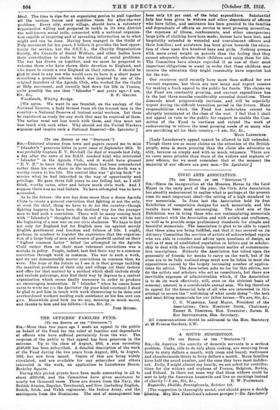[To znz EDITOR or TES " SPECTATOR."] &a,—Enforced absence from
town and papers caused me to miss " Islander's " generous letter in your issue of September 30th. It was probably Captain E. V. Birchall (he died of wounds last July, a day after the news of his D.S.O. reached him) who interested " Islander " in the Agenda Club; and it would have pleased " E. V. B." to know that the Agenda ideas had been remembered rather than his own share in the matter. His fine death was a worthy crown to his life. His central idea was " giving back " in service what he had inherited in the way of opportunity and privilege. He gave three full years to our failing but, as I still think, worthy cause, after and before much civic work. And I suppose there was no real failure. To have attempted was to have succeeded.
As to the future : the war has done more than a dozen Agenda Clubs to create a general conviction that fighting is not the only, or even the chief, thing we have to do for the country—though fighting happens to have been the destined way for the younger men to find such a conviction. There will be many coming back with " Islander's " thoughts that the end of the war will be but the beginning of a new war on our civic slackness. We hale to find not only for England but for English men (as against merely English gentlemen) real freedom and fulness of life. I ought, perhaps, in candour to register the experience that the organiza- tion of a large body of men and women of goodwill united on their " highest common factor " belief (as attempted in the Agenda Club) rather than on their most vehement convictions was a mistake in policy. People, indeed, best find their way to a common conviction through work in common. The war is such a work, and we are demonstrably nearer convictions in common than we were. The hope of the future as I see it is that groups tackling the manifest problems of their city and village (or their factory and office for that matter) by a method which shall include study and exclude patronage, may find their way by degrees to a central organization which seems finally necessary in order to produce an encouraging momentum. If "Islander " when he comes home cares to write me eio the Spectator (by your kind courtesy) I shall be glad to put him in touch with work clamouring to be done and overburdened workers needing such assistance as his fine sort can give. Meanwhile good luck (as we say, meaning so much more), and thanks to him and his fellows.—I am, Sir, &c., Ruus Mnsna.


































 Previous page
Previous page